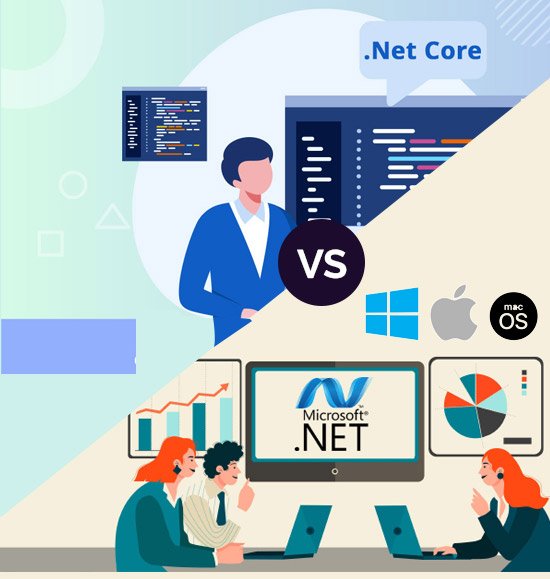A while back, it was predicted by established developers that .NET Core would be the next best thing overall as it offered developers many options in app development. There is no doubt that there is a huge demand for developers who are adept at working with this technology. But the question of how does .NET Framework differs from the .NET Core seems to bewilder them.
As we at Copperchips are highly efficient in the two frameworks, we are in a better position to answer and explain this question. So how to answer this question along with what developers need to know to utilize both of them effectively. In this article, we will not only compare and contrast .NET Core with .NET Framework but we will also provide developers with additional information regarding the two that will enable them to utilize them judiciously. But after reading this article, young and established developers will be able to confidently choose one between the two for their next app development project.
Let’s first begin with a brief overview of the two.
What is .NET Framework?
Before diving into the technicalities of .NET Framework, let us first understand what is a framework. A framework aims to make core programming easy. In other words, a developer does not need to start programming from scratch every time a project is assigned. Instead, the developers can utilize the tools incorporated in frameworks to facilitate app development. Hence, it can be justly said that frameworks are software that makes the lives of developers easier by allowing them to take control of the entire development process from a single platform.
.Net framework is a software development platform from Microsoft that is used for building and running Windows applications. The framework consists of developer tools, programming languages, and libraries that are utilized for app development. For example, the apps built on this framework are deployed across multiple platforms. The framework can be worked with languages like C#, C++, Visual Basic, JScript, COBOL, and much more.
What is .NET Core?
When it comes to developing and writing premium quality technologies, no one does it as perfectly as Microsoft. .NET Core is a general-purpose cross-platform framework that is the latest version of Microsoft. At this point, it is used across the globe to build software applications for Windows, Linux, and macOS. This framework is written from scratch to make it modular and lightweight. But it can be used to create a wide variety of apps including, mobile, desktop, online, cloud, IoT, and much more. Compared to other frameworks, .NET Core is much more versatile and efficient.
.NET Core remains consistent across all supported platforms. It also implements modern development paradigms such as asynchronous programming which further ensures high performance of the developed apps.
Now, since the basic understanding of the two is clear, this will act as a backdrop for comprehending the differences between the two.
Top Differences between .NET Framework and .NET Core
In the following section, the differences between .NET Framework and .NET Core are mentioned.
Compatibility
What makes .NET Core the best in its league is indeed its compatibility with various operating systems like Windows, Linux, and macOS. In fact, the .Net’s original structure was fully re-architected to give birth to .NET Core to assist businesses to develop applications across all platforms. The performance of .NET Core is quite impressive. Its open-source attribute makes the framework even more appealing and popular to the developers for app development.
However, .NET Framework, on the other hand, supports a restrictive model. This model basically allows running apps, websites, and web services only on the Windows operating system. This framework is recommended only when an organization needs to deploy a framework for an extended time.
Performance
Let’s find out in the performance battle who wins among .Net Framework and .Net Core.
Every business owner wishes to incorporate the latest features in their applications, especially to make their apps stand apart from the rest. The performance of .NET Core has proved better as compared to its counterpart. But lately, minor performance regressions have been reported with .NET Core 3.1. The .NET Core app utilizes 2 to 3x more CPU time as compared to .NET Framework when triggered, which is about 500 ms more time. However, with the latest versions, improvement has been noticed.
The regression performance for .NET Core was slightly lower when moving from .Net Framework 4.8 to .Net Core 3.1. It was found that the .NET Framework performed better than the latter. The reason is the overhead of the extra nop at the beginning of each method.
Deployment Model
One of the vital features available in .NET Core is its flexible deployment model. This means that whenever the latest version of .NET Core gets launched, so it can be instantly updated on one machine at a time without affecting the existing applications. A .NET Core can be additionally deployed for apps that need more isolation by utilizing the new app bundling tools integrated into it.
However, in .Net Framework, the web application must be deployed only on the Internet Information Server. .NET Core wins the deployment battle as it can be hosted in more than one way, thus making it more flexible.
Here are the tabulated differences between .Net Core and .Net Framework that would further clarify the developers.
| Particulars | .NET Core | .NET Framework |
| Open-Source | .Net Core is entirely open source. | Only some components of .NET Framework are open source. |
| Cross-Platform | .Net Core works on Windows, Linux and MacOS. | .NET Framework is compatible only with Windows. |
| Application Models | It can not be used for desktop applications. | It works well with desktop as well as web applications. |
| Installation | .NET Core is installed independently of the underlying operating system. | .NET Framework is installed as a single package for Windows operating system. |
| Microservices Support | .NET Core supports the development and implementation of Microservices. | .NET Framework does not support development and implementation of Microservices. |
| Performance and Scalability | .NET Core offers high performance and scalability. | It is less effective in terms of performance and scalability. |
| Android Development | .NET Core is compatible with open-source mobile app platforms. | It does not support any framework for app development. |
| Deployment Model | .NET Core automatically initiates updates in the existing applications. | Updates in .NET Framework need to be initiated manually. |
| CLI Tools | .NET Core provides lightweight editors along with command-line tools for all supported platforms. | .NET Framework is heavy for Command Line Interface which is not at all preferable for developers |
Conclusion
Any organization that runs applications on the .NET Framework might not need to migrate to .NET Core immediately. However, those who are entering the unchartered territory of app development need to make a choice. We know it’s a difficult decision to make and that’s solely why we published this article to further enlighten the readers.
We at Copperchips have been providing exemplary services of the two frameworks for at least two years now. After all, our proven track record and distinguishing skills make us the best fit for clients looking for businesses. Hence, you can evaluate our skillset by going through our success stories published on the official website.








